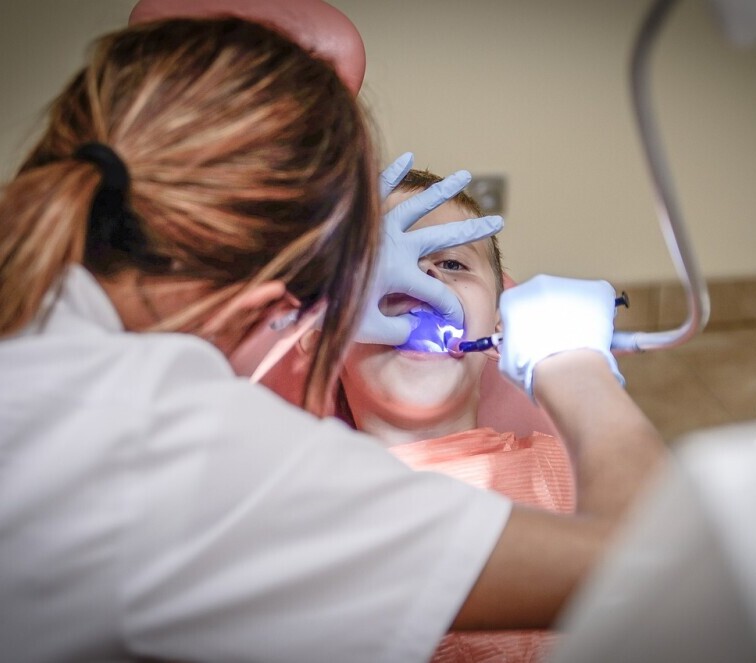Introduction
As a new parent, it’s easy to overlook dental care for your baby and wonder “when should I take my baby to the dentist”, especially when their first teeth have just started to emerge. However, establishing a dental care routine early, such as a dentist visit to a children’s dentist for your child’s first dental visit being crucial for their long-term oral health. One common questions parents often ask is, “When should I take my baby to the dentist?” This blog post will guide you through the timeline for your baby’s first dental visit, what to expect during the visit, and tips for maintaining their oral health from the start.

Table of Contents
Why Early Dental Visits Are Important
Early dental visits are more than just a checkup for your baby’s teeth. They serve as a foundation for pediatric dental care and a lifelong oral health, helping to identify and prevent potential problems before they become serious.
- Early Detection of Issues: A dentist can spot early signs of tooth decay, gum issues, or developmental problems in the jaw and mouth, which might not be visible to the untrained eye.
- Establishing Good Habits: Introducing your baby to the dentist early helps them become familiar with dental visits, reducing anxiety and fear in the future.
- Parental Guidance: During the first visit, the dentist will provide essential tips on how to care for your baby’s teeth at home, including proper brushing techniques, the right amount of fluoride, and dietary advice.
When Should I Start Dental Care for my Baby?
The American Academy of Pediatric Dentistry (AAPD) recommends that a child’s first dental visit should occur by the time their first tooth erupts or no later than their first birthday. This may seem early, but the reason is that the first year is a critical time for oral development.
Why by the First Tooth or First Birthday?
-
- Tooth Decay Prevention: Tooth decay can begin as soon as a baby’s first tooth appears. The earlier the dentist examines your baby’s teeth, the sooner any issues can be addressed.
- Educational Opportunity: This visit gives parents the chance to learn about caring for baby teeth, which are essential for proper chewing, speaking, and holding space for adult teeth.
What to Expect During the First Visit
The first dental visit is usually short and involves little treatment. It’s primarily a way to help your child feel comfortable at the dentist and to educate parents on proper oral care.
During the Visit, You Can Expect:
- A Gentle Examination: The dentist will check your baby’s teeth, gums, jaw, and bite to ensure everything is developing normally. They may also look for any signs of decay or other dental problems.
- Guidance on Oral Hygiene: The dentist will demonstrate how to clean your baby’s teeth and gums effectively. This might include tips on using a soft-bristled toothbrush and fluoride toothpaste.
- Discussion of Teething and Pacifier Use: The dentist will likely discuss teething issues, the use of pacifiers, and thumb-sucking habits, which can affect oral development.
- Nutritional Advice: You’ll receive advice on feeding practices that promote oral health, such as limiting sugary snacks and drinks that can contribute to tooth decay.
How to Prepare for the First Visit
Preparing for your baby’s first dental visit can help make the experience smooth and stress-free for both you and your child.
- Schedule Wisely: Try to schedule the appointment when your baby is usually well-rested and not hungry. A tired or hungry baby may be more irritable and less cooperative during the visit.
- Stay Positive: Your attitude can influence how your baby feels about the visit. Stay calm and positive to help reduce any anxiety your baby may have.
- Bring Comfort Items: If your baby has a favorite toy or blanket, bring it along to provide comfort during the visit.
- Prepare Questions: Make a list of any questions or concerns you have about your baby’s oral health. This is a great opportunity to get professional advice tailored to your baby’s needs.
Maintaining Oral Health Between Visits
After the first visit, maintaining your baby’s oral health at home is crucial. Here are some tips to keep your baby’s teeth and gums healthy:
- Brush Twice a Day: Once your baby has teeth, brush them twice a day with a small, soft-bristled toothbrush and a tiny smear of fluoride toothpaste (about the size of a grain of rice). For babies without teeth, you can clean their gums with a soft, damp cloth after feedings.
- Avoid Bottles at Bedtime: Putting your baby to bed with a bottle can lead to “baby bottle tooth decay.” If your baby needs comfort, offer a pacifier instead.
- Limit Sugary Foods and Drinks: As your baby starts eating solid foods, limit sugary snacks and drinks, which can contribute to tooth decay.
- Fluoride: Ensure your baby gets an appropriate amount of fluoride, either through drinking water or fluoride treatments recommended by your dentist.
Conclusion
Taking your baby to the dentist by their first tooth or first birthday is a vital step in establishing a lifetime of good oral health. Early visits allow the dentist to detect potential issues, provide valuable guidance to parents, and help your baby become comfortable with dental care. Remember, the foundation for a healthy smile starts even before all the teeth come in, so don’t delay scheduling that first dental appointment.
Ensuring your baby’s oral health is a crucial aspect of their overall well-being, and it starts with that first trip to the dentist. Be sure to check out the Signs That Your Baby Is Teething: What Parents Should Know (new-parents.com) for all the signs to be aware of, and what to do to soothe, for a teething baby.
References:
- American Academy of Pediatric Dentistry. (2022). First Dental Visit: Age One Dental Visit.
- Mayo Clinic. (2021). Infant and Toddler Health: Dental Care.
